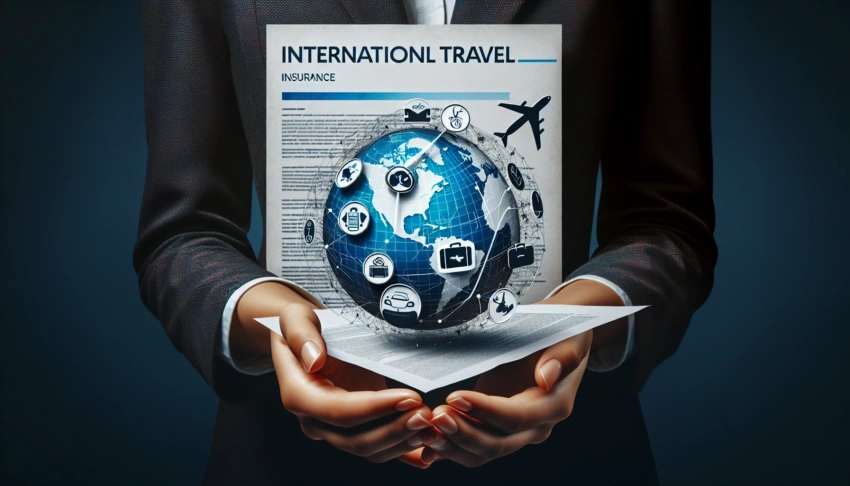Insurance Basics: Understanding Coverage for Accidents and Loss Abroad
Understanding International Insurance Coverage

Insurance Basics: Understanding Coverage for Accidents and Loss Abroad
Navigating the world of international insurance can be daunting, yet it’s crucial for anyone planning to travel or live abroad. Understanding the types and key features of international insurance policies can help you make informed decisions to ensure you’re adequately protected against unforeseen events.
1. Types of International Insurance
Traveling internationally requires insurance coverage that goes beyond typical domestic policies. The primary types of international insurance that travelers should consider include travel insurance, health insurance, and vehicle insurance.
- Travel Insurance: This type of insurance is designed to cover a range of incidents, from trip cancellations and interruptions to lost luggage and travel delays. Travel insurance policies can also offer coverage for emergency medical expenses, making them a comprehensive option for travelers.
- International Health Insurance: Essential for longer stays abroad, international health insurance provides coverage for medical expenses incurred outside of your home country. Unlike travel insurance, which is often limited to emergencies, international health insurance offers broader coverage, including routine check-ups and treatments.
- Vehicle Insurance: For those planning to drive abroad, international vehicle insurance is crucial. This coverage protects against damage to the vehicle, liability for injury or damage to third parties, and sometimes theft. It’s important to ensure that your policy meets the legal requirements of the country you are visiting.
2. Key Features of International Insurance Policies
Understanding the key features of international insurance policies is essential to ensure you receive adequate protection. These features help define the scope and limitations of your coverage.
- Coverage Limits: This is the maximum amount an insurance company will pay for a covered loss. It’s important to choose a policy with limits that adequately reflect the potential costs you might face while abroad.
- Exclusions: Policies often have specific conditions or circumstances that are not covered. Common exclusions include pre-existing medical conditions, high-risk activities, and travel to areas with government travel advisories. Carefully reviewing these exclusions can prevent unexpected out-of-pocket expenses.
- Assistance Services: Many international policies offer 24/7 assistance services that can help with medical emergencies, travel advice, and other urgent needs. This feature is particularly beneficial when navigating unfamiliar healthcare systems or dealing with emergencies in a foreign language.
Comparison of Key Features in International Insurance Policies
| Feature | Travel Insurance | Health Insurance | Vehicle Insurance |
|---|---|---|---|
| Coverage Limits | Variable, often $10,000 – $100,000 | Comprehensive, often unlimited | Variable, based on vehicle value |
| Exclusions | Pre-existing conditions, certain activities | Pre-existing conditions, elective treatments | Off-road driving, unapproved modifications |
| Assistance Services | 24/7 emergency assistance | 24/7 health support | Roadside and accident assistance |
3. Comparing Domestic and International Insurance
Domestic and international insurance policies differ significantly in terms of coverage scope and requirements. Understanding these differences is vital for travelers to ensure they are not left vulnerable when abroad.
- Scope of Coverage: Domestic insurance typically covers incidents within the home country and may offer limited emergency coverage abroad. In contrast, international insurance is designed specifically to cover events that occur outside your home country, offering a broader safety net for travelers.
- Regulatory Requirements: Domestic policies are subject to the laws and regulations of the home country, whereas international policies must comply with varying regulations across different countries. This can affect the types of coverage available and the terms of the policy.
- Premium Costs: International insurance often comes with higher premiums compared to domestic policies due to the increased risk and broader coverage areas. However, these costs can be mitigated by customizing policies to fit your specific needs and travel plans.
Understanding these fundamental aspects of international insurance is crucial for any traveler seeking peace of mind and protection while exploring the world. Selecting the right coverage ensures you are prepared for accidents and losses, allowing you to focus on enjoying your journey.
Accident Coverage While Traveling Abroad
Traveling abroad can be an exhilarating experience, but it also comes with its own set of risks, particularly concerning accidents. Understanding how insurance policies protect travelers in such scenarios is crucial to ensure peace of mind during your journey.

Punta Cana, drone view
1. Medical Expenses and Emergency Services
When an accident occurs abroad, the potential for high medical costs can be daunting. Many countries, particularly those with private healthcare systems, have significantly higher medical expenses than what you might anticipate. This makes having a comprehensive travel insurance policy that includes medical expenses and emergency services indispensable.
Insurance policies typically cover a wide array of medical-related costs, such as:
- Hospital Stays: Costs for room, board, and essential services.
- Medical Treatments: Coverage for doctor’s fees, prescriptions, and necessary procedures.
- Emergency Evacuations: If the medical facilities are inadequate, insurance often covers the cost of transportation to an appropriate facility.
Additionally, access to 24/7 emergency assistance hotlines is a common feature, providing immediate support and guidance during a health crisis.
2. Coverage for Accidental Damage and Liability
Accidents can also result in accidental damage to property or injury to others, and understanding liability coverage is key. Liability insurance is designed to protect you financially if you are responsible for damage or injury while abroad.
Comparison of Typical Liability Coverages
| Aspect | Domestic Coverage | International Coverage |
|---|---|---|
| Property Damage | Limited to specific instances | Broader coverage, often including rental properties |
| Personal Injury | Restricted to geographical limits | Global coverage with higher limits |
| Legal Expenses | Not always included | Typically included, covering legal defense |
Policies often include coverage for legal expenses, ensuring that you are not left vulnerable to the high cost of legal proceedings in a foreign country. Understanding the limits and conditions of your liability coverage can safeguard you against unexpected financial burdens.
3. Navigating Claims Process for International Accidents
Filing a claim for an accident abroad can seem intimidating, but knowing the process can simplify matters significantly. Here are steps and tips to successfully navigate the claims process:
- Document Everything: Collect as much information as possible at the scene, including photos, witness statements, and police reports.
- Notify Your Insurer Promptly: Most policies require immediate notification, so contact your insurer as soon as possible.
- Follow Instructions: Adhere to specific procedures outlined by your insurance provider to ensure your claim is processed smoothly.
Understanding these processes and your policy’s requirements can lead to a more efficient and less stressful experience when dealing with accidents abroad. Being prepared and having the right coverage allows you to travel with confidence, knowing that you’re protected against unforeseen incidents.
Section 3: Loss Coverage for International Travelers
Traveling abroad offers the thrill of new experiences, but it also presents the risk of unexpected losses. Protecting yourself against potential loss is crucial for peace of mind while exploring the world. Understanding the nuances of insurance coverage for travel-related losses can ensure you are well-prepared for any eventuality.
1. Coverage for Lost or Stolen Belongings
Losing personal belongings while traveling can be a distressing experience, especially when far from home. Fortunately, many travel insurance policies offer coverage for lost or stolen items, providing financial reimbursement for the replacement of valuables such as electronics, clothing, and travel documents. It’s important to note that coverage often comes with specific conditions and limits.
One essential aspect to consider is the policy’s coverage limit for individual items and the total claim amount.
Some policies may impose caps on high-value items like cameras and laptops, requiring travelers to purchase additional riders for full coverage.
To maximize your coverage, always report losses to local authorities as soon as possible and obtain a police report, as this documentation is usually required when filing a claim. Retaining receipts and proof of ownership can also streamline the claims process.
2. Understanding Baggage Insurance
Baggage insurance is designed specifically to cover your luggage’s safe travel. This type of insurance encompasses loss, theft, or damage to your baggage during transit. Policies vary significantly, so scrutinizing the terms is crucial to know exactly what is covered and under what circumstances.
Comparison of Baggage Insurance Policies
| Feature | Policy A | Policy B | Policy C |
|---|---|---|---|
| Coverage Limit | $1,500 | $2,000 | $2,500 |
| Single Item Limit | $300 | $500 | $750 |
| Claim Process Duration | 7 days | 10 days | 5 days |
| Additional Riders | Available | Not Available | Available |
Baggage insurance policies may also cover delayed baggage, offering reimbursement for essentials purchased while waiting for your luggage to arrive. This coverage can be a lifesaver, especially when traveling with limited clothing and personal items.
3. Protection Against Trip Cancellations and Delays
Trip cancellations and delays are unpredictable yet common occurrences that can disrupt travel plans and incur additional costs. Insurance policies that offer protection against these situations provide financial compensation for expenses like non-refundable tickets, accommodation, and pre-paid activities.
Understanding the specific scenarios covered under trip cancellation and delay insurance is crucial.
Policies typically cover cancellations due to unforeseen events such as illness, natural disasters, or other emergencies that are out of the traveler’s control. However, coverage for delays often hinges on the length of the delay and the reason behind it.
To leverage this coverage, travelers should document all expenses and keep records of communications with airlines or other service providers. This documentation is vital for substantiating claims and ensuring prompt reimbursement.

Brand-New Oceanfront Luxury Cap Cana 10BR Villa - Private Beach, Full Staff, Home Theater
from $8648 night Read more
New Bávaro Beach Beachfront Condo for Rent - Stunning Ocean View, Housekeeper & Rooftop Terrace
from $811 night Read moreOur Best Villa Rentals in Punta Cana for a Stress-Free Vacation
For those planning an escape to beautiful Punta Cana, ensuring your travel plans are secure and stress-free is key. Consider our exclusive villa rentals, where luxury meets tranquility. Each villa offers unmatched comfort and privacy, ensuring your stay is as memorable as it is relaxing.
Choosing the Right International Insurance Policy
When planning an international journey, selecting the right insurance policy is crucial to ensure peace of mind and financial protection. The right policy not only covers unforeseen incidents but also aligns with your travel plans and risk profile.
1. Evaluating Coverage Needs and Risks
Evaluating your coverage needs is the first step in choosing the right international insurance policy. Travelers should assess their individual risks and requirements based on their travel itinerary, health conditions, and activities planned during the trip.
- Consider the destination: Different countries have varying healthcare systems and costs. For instance, medical expenses in the United States are significantly higher than in Southeast Asia.
- Identify potential risks: Activities like adventure sports or visiting remote areas may require additional coverage due to higher risk levels.
- Assess pre-existing conditions: If you have chronic health issues, ensure your policy covers them, as many insurers exclude pre-existing conditions.
By evaluating these factors, travelers can better understand the type and level of coverage they need, ensuring they are adequately protected throughout their journey.
2. Comparing Insurance Providers and Plans
With numerous insurance providers offering a variety of plans, it can be overwhelming to choose the most suitable one. Here are some tips to help you make an informed decision:
- Research and reviews: Look for customer reviews and ratings to gauge the reliability and customer service quality of providers.
- Compare coverage and exclusions: Ensure you understand what is included in the policy and any exclusions that might affect your trip.
- Evaluate cost versus benefits: While a cheaper plan may be appealing, it might not offer comprehensive coverage. Balance the cost with the benefits offered.
- Check for additional perks: Some policies offer extras like trip cancellation coverage or emergency evacuation services at no extra cost.
By comparing these aspects, travelers can select a plan that offers the best value and protection for their specific needs.
Comparison of Top International Insurance Providers
| Provider | Key Features | Customer Rating |
|---|---|---|
| World Nomads | Adventure coverage, 24/7 assistance | 4.5/5 |
| Allianz Global Assistance | Comprehensive plans, trip cancellation | 4.2/5 |
| AXA Assistance USA | Wide network, medical evacuation | 4.3/5 |
3. Understanding Policy Terms and Conditions
The fine print of an insurance policy is where crucial details lie, which can significantly impact your coverage. Understanding these terms and conditions is essential to avoid any unexpected issues during your travels.
Key factors to consider include coverage limits, exclusions, pre-existing condition clauses, and the process for filing a claim. It is advisable to thoroughly read and understand the policy document or consult with an insurance expert if needed.
- Coverage limits: Be aware of the maximum payout limits for different coverage areas, such as medical expenses or personal liability.
- Exclusions: Know what is not covered by the policy, such as certain high-risk activities or specific destinations.
- Claim process: Familiarize yourself with the claim filing procedure, required documentation, and timelines for reimbursement.
By paying attention to these aspects, travelers can ensure they select a policy that offers robust protection and aligns with their travel plans, ultimately leading to a worry-free journey.
Tips for Managing Insurance While Traveling
Traveling abroad can be an exhilarating experience, but unexpected situations can sometimes dampen the adventure. Having a robust plan for managing your insurance while on the go ensures that you’re prepared for any eventuality. Here are some practical tips to help you navigate insurance matters with ease during your travels.
1. Keeping Documentation Handy
Ensuring that all your insurance documentation is easily accessible can make a significant difference in an emergency. By having your documents ready, you can act swiftly and effectively when needed.
- Digital Copies: Store digital copies of your insurance policy, emergency contact numbers, and any correspondence with your insurer in a secure cloud storage service. This allows access from any device, anywhere in the world.
- Physical Copies: While digital copies are convenient, keep a set of printed documents in your carry-on luggage. This redundancy ensures that you have access even if you encounter technical issues or internet outages.
- Organized Information: Create a summary sheet with key information such as policy numbers, coverage limits, and emergency contact numbers. This can serve as a quick reference guide in stressful situations.
2. Contacting Your Insurance Provider Abroad
When abroad, reaching out to your insurance provider can sometimes be challenging due to time zone differences and communication barriers. Efficient communication is essential to resolving issues quickly.
- 24/7 Helplines: Verify that your insurance provider offers a 24/7 helpline for international inquiries. Save this number in your phone for immediate access.
- Language Assistance: Some insurers offer multilingual support to assist non-native speakers. Inquire if your provider offers this service to ensure clear communication.
- Email and Online Portals: Utilize email or online portals for non-urgent queries. This method provides a written record of your communication, which can be useful for future reference.
3. Handling Emergencies Without Panic
Emergencies can be overwhelming, but staying calm and composed is crucial to making the best use of your insurance coverage. Here are strategies to help you manage emergencies effectively.
- Emergency Plan: Create a step-by-step plan for potential emergencies, such as illness, injury, or theft. Familiarize yourself with local emergency services and procedures in your destination.
- Local Resources: Identify local hospitals, police stations, and consulates that can provide assistance. Having this information beforehand can reduce stress and allow for quicker response times.
- Insurance Utilization: Know the specifics of your coverage, including what is covered and any out-of-pocket expenses. This knowledge will guide your decisions and prevent unnecessary financial burdens.
By proactively managing your insurance matters before and during your trip, you can enjoy peace of mind and focus on the remarkable experiences that international travel offers. Preparedness is key to transforming potential setbacks into manageable situations, ensuring your journey remains as seamless as possible.
Frequently Asked Questions
What types of insurance coverage are typically available for accidents and loss abroad?
When traveling abroad, common types of insurance coverage include travel insurance, which often covers medical emergencies, trip cancellations, lost luggage, and personal liability. Additionally, some health insurance plans may provide limited international coverage, and rental car insurance may cover accidents involving vehicles rented overseas.
Is my domestic health insurance valid for medical expenses incurred abroad?
Most domestic health insurance plans offer limited or no coverage for medical expenses incurred while traveling abroad. It’s crucial to check with your insurance provider before your trip and consider purchasing a travel insurance policy that includes international medical coverage.
What should I consider when choosing travel insurance for international trips?
When selecting travel insurance for international trips, consider the coverage limits for medical expenses, emergency evacuation, trip interruption, and lost or stolen belongings. Additionally, check the policy’s coverage for pre-existing conditions and the availability of 24/7 assistance services.
Does travel insurance cover COVID-19 related incidents?
Many travel insurance policies now offer coverage for COVID-19 related incidents, such as trip cancellations due to illness or mandatory quarantine. However, coverage can vary significantly between providers, so it’s important to read the policy details carefully and confirm with the insurer.
How can I file a claim for a loss or accident that occurred abroad?
To file a claim for a loss or accident abroad, contact your insurance provider as soon as possible. Provide necessary documentation such as police reports, medical receipts, and proof of ownership for lost items. Keep detailed records of all communications with the insurer.
Will my car rental insurance cover accidents abroad?
Car rental companies often offer insurance options that cover accidents abroad. It’s important to review the rental agreement and insurance terms to understand the coverage limits and any exclusions. Some credit cards also provide rental car insurance, which may include international coverage.
What should I do if I experience an accident or loss abroad and don't have insurance?
If you experience an accident or loss abroad without insurance, seek assistance from your country’s embassy or consulate, as they can provide guidance and support. Additionally, you may need to cover expenses out-of-pocket, so it’s important to understand the financial implications. Consider obtaining insurance coverage for future trips to avoid similar situations.
Does travel insurance cover trip cancellations due to natural disasters?
Many travel insurance policies include coverage for trip cancellations due to natural disasters, such as hurricanes or earthquakes, that make travel impossible or unsafe. Review the policy terms to understand what specific events are covered and any conditions that apply.
Can I purchase travel insurance after starting my trip?
Some insurance companies allow you to purchase travel insurance after your trip has begun, but coverage options may be limited. It’s generally advisable to buy travel insurance before leaving, as policies purchased after departure may not offer the same level of protection.
